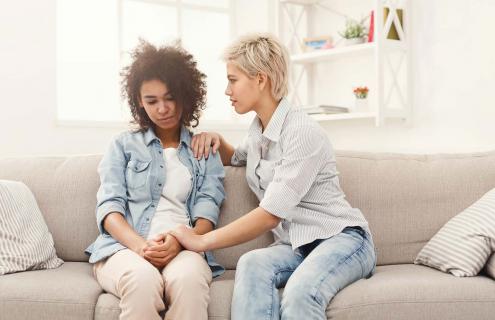
When a loved one is grieving, we sometimes turn away because we don’t know what to do. This is normal and understandable. But there are many simple, helpful ways to support your loved ones. Here are three.
First, sit with your loved one and ask if there is one task you can help with. It might be as simple as making phone calls to cancel appointments or putting on a fresh pot of coffee, or a larger task like helping to organize a memorial. Take your cues from what your loved one asks you to do, or what they want to do but can’t quite get to. Remember, they are in pain, but they are capable of healing. You are there to support them through it, not to take over their lives.
Second, let your loved one know that you are there to listen to them if they want to share their sorrow. Many times, a person suffering from grief may need your presence and your willingness to listen most of all.
When listening, keep yourself from offering advice, sharing your own experience unless asked, or trying to “fix” your loved one so they don’t have to suffer. A good listener pays close attention, listens carefully, and mirrors back what she’s hearing. That’s it. That is listening with love.
Third, if your loved one expresses a need for more comprehensive support, help them find a therapist who specializes in grief. You might also refer them to groups or organizations that bring together people who are grieving. Here are several support groups in our region:
- The Samaritans host A Safe Place Support Group, for those who've lost a friend or loved one to suicide and provide a list of other groups available for suicide survivors.
- The Homicide Survivors’ Support Group was begun by the N.H. Attorney General’s Office and is offered free of charge to anyone affected by homicide. It meets the third Thursday of every month at 6:30 p.m. at Sturtevant Chapel on Washington Street.
- Home Healthcare Hospice and Community Services in Keene has a bereavement coordinator for people whose deceased loved one received hospice services. The organization sometimes holds grief support groups and can link a survivor with various groups and organizations in the region.
- Dartmouth Health provides a list of bereavement support groups from the Monadnock Region to the Upper Valley. The Aging Resource Center offers resources and Dartmouth Health offers a range of support groups.